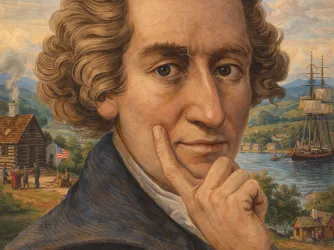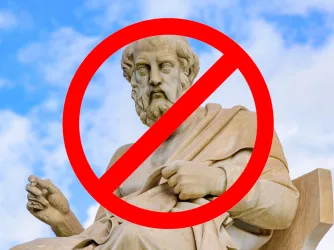Table of Contents
Special issue: Public libraries becoming First Amendment battlefield — First Amendment News 365

First Amendment News is a weekly blog and newsletter about free expression issues by Ronald K. L. Collins. It is editorially independent from FIRE.
Introduction
The First Amendment is premised on the notion that some expression will always offend some people some of the time. The constitutional and cultural trick is to render the free speech principle as robust as possible without making it a suicide pact. Supreme Court Justice Oliver Wendell Holmes was fine with that. Justice Louis Brandeis was committed to that. Justice Hugo Black was largely devoted to that. Justice William Brennan gave staying power to that. Justice Anthony Kennedy reinvigorated that, and Chief Justice John Roberts is the latest to lend his name to that. Of course, the devil lurks in the details such that an element of nuance is needed to reduce the harms of runaway absolutism.

Enter the printed word. Since the invention of type, books have regularly posed a threat to the existing establishments of the day — thus did the papacy rightfully fear Martin Luther and his printed Bible. In the eyes of the established order, books were often viewed as one of Lucifer’s most powerful tools. More than almost anything else, books became agents of change, a change so great that they not only transformed religious, legal, and political worlds but also revolutionized all forms of learning. After all, this new technology, declared Francis Bacon, changed “the appearance and state of the whole world” in ways that demanded that historians “take note of the force, effect, and consequences of Gutenberg’s invention.”
It is thus no surprise that the First Amendment is not confined to speech. It also protects “freedom of the press” (understood as a technology). Books are the fruit of that product, which, in turn, need a place to be stored. Ever since the first free modern public library was opened in 1833 in Peterborough, New Hampshire, the offense that was sometimes associated with books came to be associated with libraries. If books bearing on religion, politics, sex, or whatever are seen as offensive, then the all-too-natural tendency is to remove such books from public libraries. That has long been the censorial mindset, the tendency to scrub away ideas deemed too offensive to rest on library shelves.

Today’s book censors are offended by critical portrayals of our past: They take strong exception to books that break from the Norman Rockwell view of America; they take umbrage at the idea that gender identity may be more fluid than traditionally thought; they are overtly self-righteous when it comes canceling anything that is inconsistent with their cultural values; and they resent whatever does not comport with their religious views.
Welcome to today’s library wars. They have once again become a First Amendment battlefield. The materials below reveal the scope of that war and how it is being waged.
“This year [2022], proposed educational gag orders have increased 250 percent compared to 2021. Thirty-six different states have introduced 137 gag order bills in 2022, compared to 22 states introducing 54 bills in 2021. While there has been a decline in new gag order laws passed from 12 last year to 7 this year, overall, legislative attacks on education in America have been escalating — fast.” — PEN America
Related
“PEN America Index of Educational Gag Orders” (updated weekly)
More in the news
- “NCAC condemns unconstitutional censorship legislation in North Dakota,” National Coalition Against Censorship (Jan. 30)
- Adora Namigadde, “Facing pressure to ban books, suburban libraries ‘becoming a battlefield for the First Amendment’,” Chicago Sun-Times (Jan. 28)
- Leyla Santiago, “Florida school district begins ‘cataloging’ books to comply with DeSantis-backed law,” CNN (Jan. 25)
- Neil Schoenherr, “WashU Expert: Proposed Missouri library rule violates First Amendment,” Newsroom (Jan. 10)
- Aaron Terr, “Florida school district removes library books in response to public complaints, defying First Amendment and district policy,” FIRE (Jan. 10)
- Debra Hale-Shelton, “Jonesboro lawmaker targets librarians with legislation that could lead to jail or prison sentences,” Arkansas Times (Jan. 22)
Book ban supporters can claim they're not banning books because, in theory, books can be 'vetted' and restored to the shelves. Of course, this is how all book bans throughout time have worked. They rarely, if ever, cover all the books all the time. But even when books are finally released to potential readers under a 'ban first, ask questions later' system, the message is sent: Books are presumed inherently dangerous. Instead of being glad that a child is reading a book, the system treats every child with a book as suspicious. Policies like this have a ripple effect, recasting reading not as a social good but a threat to be strictly regulated. — Amanda Marcotte, Salon (Jan. 25)
Recent books on book banning

- Shannon Oltmann, ed., “The Fight against Book Bans: Perspectives from the Field,” Libraries Unlimited (June 30)
- Meryl Loonin, “Banned Books: The Controversy Over What Students Read,” Referencepoint Pr. Inc. (Jan. 1)
- Pedro A Gonzalez Jr., “The Human Need for Censorship: From Libraries To The Internet, Information Access Bestows Rights To The Powerful,” Editorial Letra Viva (2022)
- Kristin Pekoll, “Beyond Banned Books Defending Intellectual Freedom Throughout Your Library,” American Library Association (2019)
Related
- Catherine J. Ross, “Lessons in Censorship How Schools and Courts Subvert Students’ First Amendment Rights,” Harvard University Press (2015)
- Paul Scales, “Scales on Censorship Real Life Lessons from School Library Journal,” Rowman & Littlefield Publishers (2015)
- Martin Garnar and Trina Magi, eds, “A History of ALA Policy on Intellectual Freedom: A Supplement to the Intellectual Freedom Manual,” American Library Association (2015)
- Kathy Barco and Valerie Nye, eds. “True Stories of Censorship Battles in America's Libraries,” American Library Association (2012)
- Louise S. Robbins, “The Dismissal of Miss Ruth Brown: Civil Rights, Censorship, and the American,” University of Oklahoma Press (2001)
Amazon’s decision to withhold thousands of ebooks and audiobooks from U.S. public libraries indicates that the company is not serious about its obligations to the nation’s readers, PEN America said today.
Supreme Court cases on book banning
- Board of Education, Island Trees School District v. Pico (1982)
- United States v. American Library Association (2003)
Related
- Judith Haydel, “Libraries and Intellectual Freedom,” The First Amendment Encyclopedia
- “Case Categories: Book Banning and Libraries,” The First Amendment Encyclopedia
- Scott Bomboy, “The First Amendment and school library book policies,” National Constitution Center (Oct. 14)
- Robert Corn-Revere, “United States v. American Library Association: A Missed Opportunity for the Supreme Court to Clarify Application of First Amendment Law to Publicly Funded Expressive Institutions,” Cato Supreme Court Review (2003)
Shearer on book banning critical race theory
- Marisa Shearer, “Banning Books or Banning BIPOC?,” Northwestern University Law Review Online (2022)

Following the murder of George Floyd in May 2020, social justice movements renewed calls for the country to confront the pervasive reality of systemic racism in the United States. In response to these publicized social justice movements, however, calls for book bans relating to critical race theory began rising at an unprecedented rate. Although book ban censorship is not novel, the recent shift in focus to remove critical race theory from public school libraries marks a new era of content-based censorship.
This Essay examines why current book bans targeting critical race theory are content-based restrictions that necessarily violate the First Amendment. It explores the social and legal history of book bans in the United States and discusses recent trends in book ban censorship. This Essay then identifies First Amendment ‘areas of non-protection through which book ban proponents seek to exclude race-related content and analyzes why all are pretextual fallacies that undermine freedom of speech principles and mandate diversity in the judiciary.
NCAC releases new resource for authors of banned or challenged books
The National Coalition Against Censorship (NCAC) [recently] released a new resource that provides practical advice for authors whose books are being challenged and banned in K – 12 schools and libraries. Prepared in collaboration with writers who have faced censorship, it is available on the NCAC website.
Book challenges can be exasperating, demoralizing, and deeply painful for authors whose works are deemed inappropriate for young readers. For decades contemporary and classic books have been in the crosshairs of censors. Today the censors are targeting titles by or about people of color and those that address GLBTQIA+ issues.
Because book challenges can happen anytime and seemingly for any reason, NCAC’s Arts & Culture Advocacy Program (ACAP) solicited advice from authors whose books have been attacked, including Jonathan Evison (Lawn Boy), Frederick Joseph (The Black Friend), Jo Knowles (Pearl), Susan Kuklin (Beyond Magenta), Meg Medina (Yaqui Delgado Wants to Kick Your Ass), and Lesléa Newman (Heather Has Two Mommies”). They provide a wealth of best practices to address book challenges and advocate for the return of banned titles.
PBS NewsHour: ‘Nationwide effort to ban books challenges freedom of speech’
Advocates are sounding the alarm about a set of measures that they say target teaching and writing related to LGBTQ issues, race and freedom of speech. Around the country, efforts to ban specific books or even whole categories of books are on the rise. Jeffrey Brown has a conversation for our arts and culture series, “CANVAS.”

YouTube: ‘The First Amendment in Libraries with Deborah Caldwell-Stone’
Deborah Caldwell-Stone is the Director of ALA’s Office for Intellectual Freedom and Executive Director of the Freedom to Read Foundation. For over twenty years she has worked closely with library professionals and library trustees on a wide range of intellectual freedom issues related to library service in the United States. She has served on the faculty of the ALA-sponsored Lawyers for Libraries and Law for Librarians workshops and is a contributor to the 10th edition of the Intellectual Freedom Manual. She has contributed articles on law, policy, and intellectual freedom to American Libraries and other publications.

YouTube: Forum on book bans and First Amendment
- “Book Banning and the First Amendment,” Freedom Forum (2022)
Book bans have recurred throughout American history. In recent months, school boards, lawmakers, political activists and others have expanded the scope of book bans in our nation's schools and libraries. The First Amendment protects our right to read the books we choose, so what place do book bans have in our public libraries and schools? Suzanne Nossel, CEO of PEN America, talks about this escalating trend and its threat to free expression This conversation, taped at the Library of Congress on June 21, 2022, was a capstone event celebrating the Freedom Forum's 30th anniversary.

2022-2023 SCOTUS term: Free expression and related cases
Review granted
- 303 Creative LLC v. Elenis (argued Dec. 5)
- Jack Daniel’s Properties, Inc. v. VIP Products LLC
- United States v. Hansen
- Counterman v. Colorado
Pending petitions
- Keister v. Bell
- O’Connor-Ratcliff v. Garnier
- Soto v. Texas
- Chen v. Texas
- Moore v. Texas
- Barton v. Texas
- U.S. v. Hernandez-Calvillo
- Price v. Garland
- Moore v. Texas
- Barton v. Texas
- Arkansas Times v. Waldrip
- Moody v. NetChoice, LLC
- NetChoice, LLC v. Moody
- Florida v. NetChoice
- Novak v. City of Parma
- Klein v. Oregon Bureau of Labor and Industries
State action
Qualified immunity
Immunity under Foreign Sovereign Immunities Act
- NSO Group Technologies Limited v. WhatsApp Inc. (cert. denied)
Liability Anti-Terrorism Act
- Twitter v. Taamneh (argument Feb. 22)
Section 230 immunity
- Gonzalez v. Google (argument Feb. 21)
Review denied
- My Pillow v. U.S. Dominion (news story)
- Kowall v. Benson
- Tofsrud v. Spokane Police Department
- Swanson v. Griffin County
Previous FAN
This article is part of First Amendment News, an editorially independent publication edited by professor Ronald K. L. Collins and hosted by FIRE as part of our mission to educate the public about First Amendment issues. The opinions expressed are those of the article’s author(s) and may not reflect the opinions of FIRE or of professor Collins.
Recent Articles
Get the latest free speech news and analysis from FIRE.

A royal Paine

Can the Pentagon strip Mark Kelly’s rank over speech?

Texas A&M to philosophy professor: Nix Plato or be reassigned


